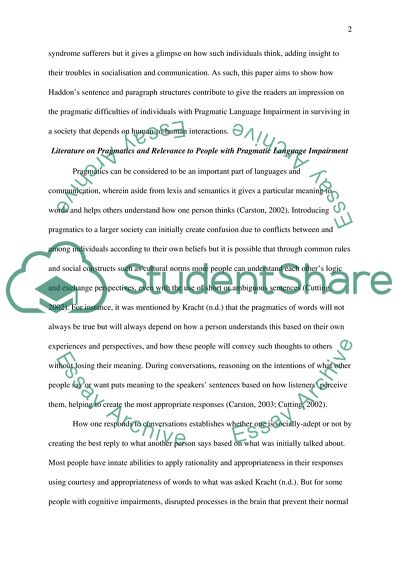Cite this document
(Pragmatic Language Impairment Case Study Example | Topics and Well Written Essays - 2000 words, n.d.)
Pragmatic Language Impairment Case Study Example | Topics and Well Written Essays - 2000 words. https://studentshare.org/english/1821372-what-are-the-pragmatic-difficulties-that-aspergers-sufferers-typically-display-how-does-mark-haddon-use-language-to-portray-the-pragmatic-difficulties-endured-by-the-narrator-in-the-curious-incident-of-the-dog-in-the-nighttime
Pragmatic Language Impairment Case Study Example | Topics and Well Written Essays - 2000 words. https://studentshare.org/english/1821372-what-are-the-pragmatic-difficulties-that-aspergers-sufferers-typically-display-how-does-mark-haddon-use-language-to-portray-the-pragmatic-difficulties-endured-by-the-narrator-in-the-curious-incident-of-the-dog-in-the-nighttime
(Pragmatic Language Impairment Case Study Example | Topics and Well Written Essays - 2000 Words)
Pragmatic Language Impairment Case Study Example | Topics and Well Written Essays - 2000 Words. https://studentshare.org/english/1821372-what-are-the-pragmatic-difficulties-that-aspergers-sufferers-typically-display-how-does-mark-haddon-use-language-to-portray-the-pragmatic-difficulties-endured-by-the-narrator-in-the-curious-incident-of-the-dog-in-the-nighttime.
Pragmatic Language Impairment Case Study Example | Topics and Well Written Essays - 2000 Words. https://studentshare.org/english/1821372-what-are-the-pragmatic-difficulties-that-aspergers-sufferers-typically-display-how-does-mark-haddon-use-language-to-portray-the-pragmatic-difficulties-endured-by-the-narrator-in-the-curious-incident-of-the-dog-in-the-nighttime.
“Pragmatic Language Impairment Case Study Example | Topics and Well Written Essays - 2000 Words”. https://studentshare.org/english/1821372-what-are-the-pragmatic-difficulties-that-aspergers-sufferers-typically-display-how-does-mark-haddon-use-language-to-portray-the-pragmatic-difficulties-endured-by-the-narrator-in-the-curious-incident-of-the-dog-in-the-nighttime.


